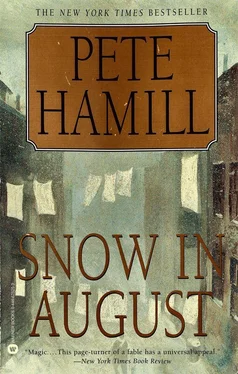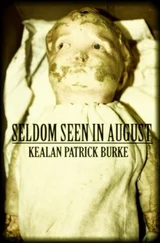Pete Hamill - Snow in August
Здесь есть возможность читать онлайн «Pete Hamill - Snow in August» весь текст электронной книги совершенно бесплатно (целиком полную версию без сокращений). В некоторых случаях можно слушать аудио, скачать через торрент в формате fb2 и присутствует краткое содержание. Год выпуска: 2009, ISBN: 2009, Издательство: Grand Central Publishing, Жанр: Современная проза, на английском языке. Описание произведения, (предисловие) а так же отзывы посетителей доступны на портале библиотеки ЛибКат.
- Название:Snow in August
- Автор:
- Издательство:Grand Central Publishing
- Жанр:
- Год:2009
- ISBN:9780446569668
- Рейтинг книги:3 / 5. Голосов: 1
-
Избранное:Добавить в избранное
- Отзывы:
-
Ваша оценка:
- 60
- 1
- 2
- 3
- 4
- 5
Snow in August: краткое содержание, описание и аннотация
Предлагаем к чтению аннотацию, описание, краткое содержание или предисловие (зависит от того, что написал сам автор книги «Snow in August»). Если вы не нашли необходимую информацию о книге — напишите в комментариях, мы постараемся отыскать её.
Snow in August — читать онлайн бесплатно полную книгу (весь текст) целиком
Ниже представлен текст книги, разбитый по страницам. Система сохранения места последней прочитанной страницы, позволяет с удобством читать онлайн бесплатно книгу «Snow in August», без необходимости каждый раз заново искать на чём Вы остановились. Поставьте закладку, и сможете в любой момент перейти на страницу, на которой закончили чтение.
Интервал:
Закладка:
“What a grand thing to do, Rabbi,” Kate Devlin said, smiling in a beautiful way. Michael wondered if the rabbi saw her as beautiful too. She examined the date on the tickets and gave them back to the rabbi. Two weeks away. “But you know, he’ll still have the cast on his leg.”
“We’ll get there, Mom,” Michael insisted. “Don’t worry.”
Then he asked Rabbi Hirsch for one final favor: to sign his cast. The rabbi smiled and wrote on the smooth, hard plaster in chiseled Hebrew lettering. Michael thought: No ironworker has that on his cast. And they said good night.
“Please, Rabbi,” Kate Devlin said, “be careful.”
“Thank you.”
“Mom, he got away from the Gestapo . He should be able to get away from the Falcons.”
The rabbi smiled in a tired, knowing way and was gone.
“He’s a good man,” Kate said, as she locked the door behind him. “And very sad.”
In the morning, Michael began his own version of spring training. He went to the roof and packed two Campbell’s Soup cans with pebbles and taped the ends and started doing curls to build up his arms. He lay on his back and pedaled his legs in the air. The cast on his lower right leg was very heavy; he could only pedal it six times at first. Then eight. Then ten. After a few days, the weight of the cast lessened; he then tied the packed soup cans to his good left leg, to even out the weight. His foot sweated heavily inside the cast, and he had to scratch himself with a school ruler or a butter knife. But he was getting stronger. He could feel it.
Each day when his mother left for work, he laid out his schoolbooks on the table and studied, made notes, drilled himself in math and catechism and history. The radio played all day long, but he was able to concentrate on the schoolwork. He would take the exams soon; he wanted to do better than he’d ever done in the past. To hit singles and doubles. To race home, like Jackie Robinson. He even reviewed all the goddamned rules of English grammar and stopped himself when his mind wandered into the more adventurous terrain of Yiddish. In some weird way, trying to learn Yiddish made him understand English better. Grammar was like the frame of a building, he thought, the structure, what you had to build before you put in the floors or the walls or the roof. Maybe it was boring, but it was necessary. It was like playing baseball. The sportswriters kept talking about how Robinson knew the fundamentals. The basics. The rules. They really meant he’d learned how to play baseball the right way. Not like it was a goddamned hobby. For Robinson, baseball wasn’t stamp collecting or model airplanes or something. It was his life.
There was so much to learn. Not just to pass tests, but to get ready for his life. Rabbi Hirsch had said to him once, translating a proverb from Yiddish: “The sea has no shore, learning has no end.” Now, in his solitude, Michael knew what he meant. He looked up the proper nouns he’d heard from Rabbi Hirsch during the long night in the Devlin kitchen: Munich, the Sudetenland, Piraeus, Trujillo, the Dominican Republic. None of them were in his schoolbooks and only the Dominican Republic was in the blue books. The entry explained that this was where Columbus was buried, on an island shared with Haiti, where everybody spoke French. It said that a guy named Trujillo was the dictator, just as Rabbi Hirsch said, and that he had brought the country good government.
He also found an entry in the blue books for Antonín Dvořák, who died in 1904 and wrote a masterpiece called the New World Symphony , which used music from Negroes and American Indians. But there was nothing on Mahler or Smetana. They were out there, in the sea without a shore. He wanted to know everything about them, but with the cast on his leg he still could not risk a trip to the library on Garibaldi Street, where there was a much larger encyclopedia. He would wait. And use his time in other ways. And when they finally got a phonograph, he would save up to buy the New World Symphony .
He did not go down to the street. News of the parish was filtered through his mother, or Mrs. Griffin, who stopped by every few days to talk about dreams. The worst news was that a fire burned out the orchestra section of the Venus and the disgusted owner just gave up and closed the place. There was talk that the Falcons had set the fire because the owner threw Tippy Hudnut out for exposing himself to a twelve-year-old girl. Nobody could prove it. Not the exposure. Not the arson. And Michael imagined a roundup of all the characters who had passed across the screen in the dark: Gunga Din and Dr. Cyclops, Ken Maynard and the Durango Kid, Humphrey Bogart and James Cagney, Bing Crosby and Edward G. Robinson, along with Tarzan, King Kong, Superman, the Masked Marvel, and Dick Tracy. He pictured them all together, coming off the screen, riding horses, driving cars, swinging from ropes in the jungle, and saying their goodbyes. All of them. Even Dracula. Even Dr. Frankenstein and his monster.
But there was no farewell, and from the rooftop Michael could see the marquee and the letters he knew said CLOSED. Sometimes, sweaty and tired after lifting weights, he would lie on his stomach on the raised canopy that rimmed the roof and gaze down into Ellison Avenue and his lost summer. He often saw Sonny Montemarano and Jimmy Kabinsky walking with other kids, drinking sodas, pitching pennies against the wall of the diner. He could see part of their ball games. They never looked up. He did not call down.
Other times, he would lie on his back on the canopy and gaze at the clouds. He watched them shift and change, as if in the hands of magicians, immense gauzy sculptures in the blue summer sky. One day he saw Winston Churchill there, smoking his cigar. He saw CúChulainn shaking his fist at the English. He saw Indians peering from cliffs and soldiers holding hand grenades. He saw Pilgrims, lions, trucks, mountains, the bodies of women, the Hunchback of Notre Dame, huge galleons in full sail, deep-sea divers, dogs, igloos, and the mushroom cloud of the atom bomb. Once, in late afternoon, with the sun dropping toward New Jersey, and the clouds all mauve and lavender, he saw the Golem.
Immense.
Faceless.
His arms outstretched.
Waiting to be called.
One afternoon, after reading about Dvořák, he tried to imagine the New World Symphony . He had never heard a note of it, but he would try to make it up. He closed his eyes, and could see Columbus on the Atlantic, the waves higher than his masts, and the music was full of danger and the sounds of crashing waves, dark music full of fear too, for they must have been terrified, going where nobody had gone before. The fear of drowning. The fear of sea serpents. And then the music softened in his head. The sun appeared. The sea was like glass. And in the music he could hear birds. Calling them all. Gathering on the masts. Coming from land. Coming from America. The music was happy then and full of the sun and thick green jungle foliage and the sound of flutes and Indians coming to see them in canoes, bringing water and flowers. The New World!
Michael hummed his imaginary symphony, seeing fights with Indians then and arrows in the air and blood on the ground and more white people coming, from Spain and England, bringing colored people after them in chains, and then there were drums in Michael’s head: drums from Africa; the drums of Indians; drums while Cortez conquered Mexico, and drums when the Pilgrims came to Plymouth Rock, and drums during the Revolution, and snare drums for the Civil War. He made the drum sounds: BUM bum bum bum, BUM bum bum bum , adding a trumpet to make the screams. And invented bugles for George Armstrong Custer, who died on the Little Big Horn and came back to life in the RKO Grandview, only to die there forever. He made great ooooohhhhhhing sounds and awwwwwing sounds when the land filled with wheat and corn and cattle and schoolhouses, when he could see the Grand Canyon and the Rockies, the sound of majesty, right out of all the cowboy movies when the wagon trains came to the Promised Land, to what Rabbi Hirsch called the land of milk and honey. He gave a sound to the sunsets, a little sad, and a happy sound to the sunrise, like Louis Armstrong. He tried to imagine the sound of the color red. He made a whooshing sound for a fast river, and threw in a train whistle as the railroad pushed west, and then the blues, sad and melancholy, and jigs and reels for the Irish arriving and “O Sole Mio” for the Italians, and was trying to imagine music from the Jews, when he saw Bing Crosby, as he wandered over yonder just to see the mountains rise. Let me be by myself in the evening breeze. Listen to the murmur of the cottonwood trees. Send me off forever but I ask you please .… And ended in Ebbets Field. The music for the color green sounded like buy me some peanuts and Cracker Jack. I don’t care if I ever get back .
Читать дальшеИнтервал:
Закладка:
Похожие книги на «Snow in August»
Представляем Вашему вниманию похожие книги на «Snow in August» списком для выбора. Мы отобрали схожую по названию и смыслу литературу в надежде предоставить читателям больше вариантов отыскать новые, интересные, ещё непрочитанные произведения.
Обсуждение, отзывы о книге «Snow in August» и просто собственные мнения читателей. Оставьте ваши комментарии, напишите, что Вы думаете о произведении, его смысле или главных героях. Укажите что конкретно понравилось, а что нет, и почему Вы так считаете.












